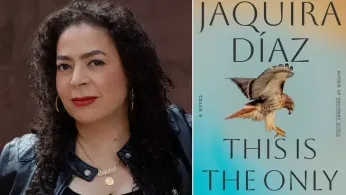
4 hours ago
Jaquira Díaz Unveils "This Is the Only Kingdom": A Bold New Novel of Identity, Family, and Queer Resilience
READ TIME: 3 MIN.
The literary world marks a significant moment with the release of "This Is the Only Kingdom", the latest novel by Whiting Award-winning writer Jaquira Díaz. Published on October 21, 2025, the novel cements Díaz’s reputation as a voice of rare power in contemporary literature, blending her lyrical prose with a piercing examination of identity, family, and the burdens and joys of queer existence .
Set in el Caserío, a tightly woven working-class barrio in Puerto Rico, "This Is the Only Kingdom" follows Maricarmen and her daughter Nena as they navigate the aftermath of a murder that fractures their family and community . The story begins with Maricarmen’s relationship with Rey el Cantante, a local musician and small-time Robin Hood figure who inspires her to dream beyond the confines of her daily life. But circumstances conspire to keep her tethered to the community and its struggles, with the narrative spanning fifteen years to when Maricarmen and Nena become the focus of a murder investigation that threatens to tear apart what remains of their family .
Rich in atmosphere and grounded in the lived experiences of Puerto Rico’s working class, the novel explores not only the social and economic challenges of its setting but also the complexities of familial love, betrayal, and the search for belonging.
Central to "This Is the Only Kingdom" is the story of Nena, a teenager coming of age amidst loss and upheaval. Nena’s journey is marked by her exploration of her sexual identity in a community that is not always accepting . Díaz, herself a queer Afro-Latina woman, brings authenticity and nuance to Nena’s experience, drawing on her own history of negotiating identity in environments marked by both love and hostility .
The novel’s depiction of queer adolescence is informed by Díaz’s commitment to representing the full spectrum of LGBTQ+ lives in literature. Her previous works, including her memoir "Ordinary Girls", have been praised for their unflinching honesty and the depth of their engagement with issues of sexuality, race, and class . In "This Is the Only Kingdom", Nena’s internal and external battles become emblematic of the broader struggle for queer visibility and acceptance in Latinx communities.
Díaz’s own background—growing up between Humacao, Fajardo, and Miami Beach, and enduring hardships related to poverty, discrimination, and family instability—shapes the emotional core of her writing . Her fiction and essays have frequently delved into the realities of young women and LGBTQ+ people striving for survival and dignity in environments fraught with danger and prejudice. "This Is the Only Kingdom" extends this trajectory, offering a narrative that is as much about resisting erasure as it is about the pain and beauty of self-discovery.
Díaz’s work has been widely recognized for its cultural significance and literary merit. She is the recipient of numerous honors, including the Whiting Award, Florida Book Award, and the Jeanne Córdova Prize for Lesbian/Queer Nonfiction, as well as being a Lambda Literary Award finalist . Her writing has appeared in leading publications such as The Atlantic, The Guardian, and Time Magazine, and her influence extends to both literary and queer communities.
The release of "This Is the Only Kingdom" comes at a time when the need for diverse and authentic voices in literature has never been greater. By centering the stories of queer and Latinx characters, Díaz challenges dominant narratives and expands the possibilities for representation in contemporary fiction . Early reviews and literary circles have already praised the novel’s blend of lyricism and grit, with particular attention paid to its portrayal of complex female and LGBTQ+ characters .
Díaz’s commitment to inclusivity is evident not only in her fiction but also in her public life. As an educator at Columbia University and an active participant in literary and LGBTQ+ advocacy, she continues to mentor emerging writers and champion stories that reflect the diversity of contemporary society . Her work aligns with a growing movement within publishing that seeks to foreground the experiences of those historically marginalized in mainstream narratives.
With "This Is the Only Kingdom", Jaquira Díaz opens a new chapter in a distinguished career marked by both critical acclaim and cultural resonance. The novel stands as a testament to the power of storytelling to illuminate hidden histories, challenge stereotypes, and affirm the dignity of all people—especially those at the intersections of multiple identities .
As readers around the world encounter Maricarmen, Nena, and the world of el Caserío, Díaz’s novel promises to spark vital conversations about family, community, and what it means to claim a place in a world that too often denies belonging. In doing so, she affirms her position as one of the most important queer and Latinx writers of her generation.






